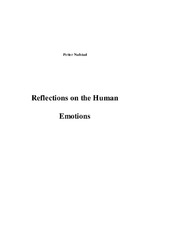| dc.description.abstract | <p>The usual way to approach the philosophical study of emotions is to start out from our emotional experiences. The feelings of anger, joy, envy, fear, sadness and so on, that we have all experienced are taken as the given facts, the data, and the research is carried out as an investigation of what is implied and presupposed in such experiences. Such approaches will reveal that emotional states contain cognitive components like beliefs, categorisations and propositional attitudes. I believe that such an approach is indispensable for the understanding of human emotions. However, even given that emotions are conscious phenomena it doesn‟t follow that they should also be explained exclusively in terms of conscious, or even potentially conscious, states. Such a conclusion would be based on the additional assumption that any true and explanatory relevant sentence describing an emotional state could also, in principle, be recognised by a subject as a true description of her mental condition.
<p>It is certainly true that human emotions are the emotions of beings that also have rational and linguistic abilities. I also take it to be true that these abilities have impact on our emotional development. Understanding the connection between the various human abilities is part of the understanding of human emotions.
<p>On the other hand, emotions might be approached from a perspective that doesn‟t so much relate them to our conscious and reflective awareness. Emotions might be viewed as parts of our “navigation-system”, parts of the way we relate to and map our surroundings, identify our relative positions in these and prepare for adequate responses to changed conditions. To be sure, conscious awareness and propositional knowledge are parts of the human mappingresponse system. But by focusing on the general system-features, we might see that 4 emotions can be studied, not only as a faculty of rational beings, but also as a species of organisms‟ ways to interact with their environment. The following text is an attempt to unite these two approaches. | |


 English
English norsk
norsk